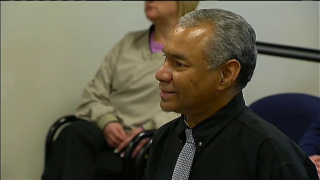
A convicted rapist from Massachusetts whose decades-long claims of innocence drew the backing of some high-profile supporters was released on medical parole Wednesday, a prisons official confirmed.
Benjamin LaGuer, sentenced to life in prison in 1984 after being convicted of raping his 59-year-old neighbor in Leominster the previous year, was released from the North Central Correctional Institute in Gardner, according to Cara Savelli, a spokeswoman for the state Department of Correction. She could not disclose any additional information.
LaGuer, 56, has terminal liver cancer, his lawyers have said in legal filings seeking compassionate release.
Correction Commissioner Carol Micci had denied his release, saying he still poses a threat to society.
LaGuer's attorney asked a judge last month to reverse Micci's decision.
An email was left with LaGuer's lawyer, Jeffrey Harris, seeking comment on his release. A person who picked up the phone at Harris' office said he was unavailable for comment.
LaGuer has always said he was wrongfully convicted, claiming misidentification by the victim, tainted evidence, poor legal representation at trial and a jury tainted by racism.
The state's courts have repeatedly rejected LaGuer's appeals, including the state's highest court in 2007.
Along the way, he drew some notable supporters, including late Boston University President John Silber, Nobel laureate Elie Wiesel and Deval Patrick, long before he became governor of Massachusetts and sought the Democratic nomination for president.
Patrick had written letters to the state Parole Board and donated money for a DNA test on behalf of LaGuer. LaGuer had hoped the 2002 test would prove his innocence, but it further linked him to the rape. At that point, Patrick distanced himself from LaGuer.
Patrick's support of LaGuer became an issue during his first run for governor in 2006, when his Republican opponent, former Lt. Gov. Kerry Healey, said Patrick's support of LaGuer showed he was soft on crime and insensitive to victims.
LaGuer's release comes with conditions according to the state Parole Board, including a curfew, and electronic monitoring.


